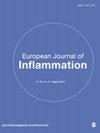促红细胞生成素肝细胞激酶受体A1通过增加肿瘤微环境中白细胞介素-6和血管内皮生长因子的表达,促进SGC-7901细胞及其移植瘤的进展
IF 0.6
4区 医学
Q4 IMMUNOLOGY
引用次数: 0
摘要
目的大量研究表明,产生促红细胞生成素的肝细胞激酶受体A1(EphA1)可促进恶性肿瘤的发生和发展,并可能与肿瘤微环境有关。但大多是现象研究,很少有深入、完整的机制研究。本研究旨在利用基因工程技术,从体外和体内两个实验维度了解EphA1如何通过调节肿瘤微环境(主要是白细胞介素-6(IL-6)和血管内皮生长因子(VEGF))来促进恶性肿瘤的进展。材料和方法利用基因工程技术分别增强和敲除SGC-7901细胞中EphA1基因的表达,并分析其对细胞功能和细胞中VEGF和IL-6表达水平的影响。随后,我们构建了人EphA1基因过表达、人EphAl基因沉默和正常表达的SGC-7901细胞裸鼠皮下移植瘤模型,并分析了肿瘤发展的差异以及肿瘤组织中VEGF和ILl-6表达水平的变化。结果EphA1基因表达增强后,SGC-7901细胞增殖、侵袭和迁移增强,细胞凋亡减弱,VEGF和IL-6表达水平升高。而当EphA1基因表达被敲低时则发现相反的结果。同时,通过基因工程技术过表达EphA1基因,可以延长裸鼠皮下移植的肿瘤形成时间和生长速度,提高肿瘤组织中VEGF和IL-6的表达水平。类似地,当EphA1基因被沉默时,在移植的肿瘤模型中发生相反的作用。结论EphA1可上调VEGF和IL-6的表达,从而增强肿瘤微环境中的炎症环境和血管生成,有助于促进SGC-7901细胞及其移植瘤的进展。本文章由计算机程序翻译,如有差异,请以英文原文为准。
Erythropoietin-producing hepatocyte kinase receptor A1 facilitating the prgression of SGC-7901 cells and its transplanted tumor by increasing the expression of interleukin-6 and vascular endothelial growth factor in tumor microenvironment
Objectives Many researches showed that Erythropoietin-producing hepatocyte kinase receptor A1 (EphA1) can promote the occurrence and development of malignant tumors and may be related to tumor microenvironment. But most of them are phenomenon studies, and there are few in-depth and complete mechanism studies. This study aims to understand how EphA1 promotes the progression of malignant tumors by regulating tumor microenvironment (focusing on Interleukin-6 (IL-6) and vascular endothelial growth factor (VEGF)) from two experimental dimensions of in vitro and in vivo by using genetic engineering technology. Material and Methods We used genetic engineering technology to enhance and knock down EphA1 gene expression in SGC-7901 cells, respectively, and analyzed its influence on cell function and the expression levels of VEGF and IL-6 in cells. Subsequently, we constructed human EphA1 gene overexpression, EphA1 gene silencing, and normal expression of human EphA1 gene subcutaneous transplanted tumor models of SGC-7901 cells nude mice, and analyzed the differences in tumor development and the changes in the expression levels of VEGF and ILl-6 in tumor tissues. Results After EphA1 gene expression was enhanced, the proliferation, invasion and migration of SGC-7901 cells were enhanced, and apoptosis was weakened, and the expression levels of VEGF and IL-6 were increased. While the opposite results were found when EphA1 gene expression were knocked down. Meanwhile, tumor formation time and growth rate of subcutaneous transplantation in nude mice were advanced and the expression levels of VEGF and IL-6 in tumor tissues were increased when EphA1 gene expression were overexpressed by genetic engineering technology. Similarly, the opposite effect occurred in transplanted tumor model when EphA1 gene was silenced. Conclusion Our study showed that EphA1 can up-regulating VEGF and IL-6 expression, thereby enhancing the inflammatory environment and angiogenesis in the tumor microenvironment, and this helps to promote the progression of SGC-7901 cells and its transplanted tumor.
求助全文
通过发布文献求助,成功后即可免费获取论文全文。
去求助
来源期刊
CiteScore
0.90
自引率
0.00%
发文量
54
审稿时长
15 weeks
期刊介绍:
European Journal of Inflammation is a multidisciplinary, peer-reviewed, open access journal covering a wide range of topics in inflammation, including immunology, pathology, pharmacology and related general experimental and clinical research.

 求助内容:
求助内容: 应助结果提醒方式:
应助结果提醒方式:


